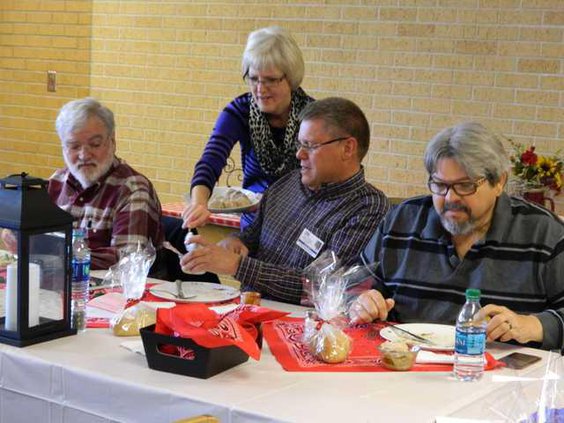USD 428 Board of Education members arrived at the library of Great Bend High School’s library Tuesday afternoon to find a feast set before them. A themed table arrangement included candles, and at each setting a complimentary small loaf of bread. Students in Kerri Batman’s family and consumer science classes had prepared a menu which included beef brisket, roasted potatoes, seasoned green beans, garden salad and fresh cracked wheat berry bread, followed by a dessert of apple crisp with homemade cinnamon ice cream. Principal Tim Friess pointed out that this was one example of the expertise high school students were capable of.
“My students asked why we are doing this for the school board,” Batman said. “I told them it’s because they serve us without pay, and its a way of showing our appreciation for what they do for us.”
Friess gave the board an update on PLC’s (professional learning communities), MTSS implementation (multi tiered systems of support), and the anticipated return of AP (advanced placement) classes.
Professionals learning together
Teachers take part in PLCs on a regular basis outside of regular class time on Wednesday mornings. To accommodate this, students have regular late-start days. Providing teachers time to meet this way has allowed some teachers in the same departments to be able to collaborate and plan curriculum where in the past conflicting class schedules did not allow, Friess said.
Also, its allowing teachers to share experience and determine how to address problems in the same way, which provides a solid message to students. One off-shoot of this is the Dream Teams, that focus on relationship building. They are tackling the issue of respect --how students show respect for one another, and their schools through the words they choose and how they treat their things, i.e. picking up their trash. Everyone needs to be on the same page about how to address the problem for it to work, Friess said.
“Our school has a large enough staff that we’ve found there are some teachers who have worked here for several years who do not know one another,” he said. “PLCs are allowing them to build relationships and that has helped in many ways.”
Literacy on the rise
This year, thanks to the implementation of MTSS, literacy labs were created to help students who are struggling to achieve grade-level reading. There are three teachers teaching five sections of literacy labs, and they are seeing measurable results. While students who are assigned to a literacy lab attend in place of an elective, they are in no danger of having their graduation requirements accumulated.
“Reading is pretty important, and we want our kids when they leave here to be capable readers,” Friess said. “Some have more than doubled their words per minute, and all have tested at an increase, some slight and others significant.”
Math labs, he said, will be a tougher nut to crack, with multiple disciplines like algebra, geometry and calculus.
Higher GPAs ahead
While a lot of focus is put on students that are in need of help, the return of Advanced Placement classes could be one way to provide an avenue to challenge top-tier students. Advanced Placement is weighted, which allows a student to achieve a higher grade point average, and is typically a more advanced curriculum. Compare this to the dual credit college level class, which is not a weighted class. This could influence the choices of students vying for a higher class rating, or even the position of valedictorian or salutatorian of their class.
Other items of discussion included:
*The approval of teacher retirements for Debbie Brown, second grade at Riley Elementary, Ginger Herrman, Direct Instruction Coordinator and ESL at Park Elementary, and Sammie Reif, ECSE at Helping Hands Preschool.
*Approval of the resignation of Kathy Baldwin, Kindergarten teacher at Riley Elementary.
*Approved the deletion of an old BOE policy on class size, which has in effect been replaced by a new one which allows teachers to request the help of a paraprofessional when class size reaches 25 students.
*Progress is being made on the 2015-2016 school calendar, Reed said. Two are under consideration, and he expects to have one to recommend to the board at the regular March meeting.
*Reed is working with the Great Bend Area Chamber of Commerce and Economic Development to determine criteria for a Graduate of Promise distinction for the future, as well as a back-to-school kick-off event for teachers.
The next regular meeting of the USD 428 Board of Education will be Monday, March 9, at 5 p.m. at the district offices.
USD 428 BOE meets
School Board Dine and Discuss





